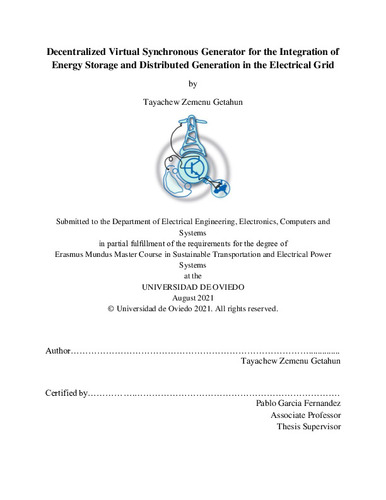Decentralized Virtual Synchronous Generator for the Integration of Energy Storage and Distributed Generation in the Electrical Grid
Autor(es) y otros:
Director(es):
Fecha de publicación:
Serie:
Máster Universitario Erasmus Mundus en Transporte Sostenible y Sistemas Eléctricos de Potencia
Resumen:
Distributed generations are increasingly integrated to the electric grid marking the utilization of Renewable Energy Sources (RES) that are sustainable to the environment. The intermittency level, and form of energy obtained from these distributed sources require power converters with a robust control topology to fulfil the grid requirements. Conventional power converter control methods have limitations in synchronization to the grid during contingencies and doesn’t provide inertial support. The inertial support and power matching synchronization capabilities seen in conventional synchronous generation power systems inspired to emulate its electrical and electromechanical characteristics virtually in the control of distributed generation power converters. Distributed generations can be located at different distances to the grid Point of Common Coupling (PCC), and hence providing an aggregated grid support is essential by which a locally embedded Synchronous Power Controller (SPC) could only provide the support at the connection point. This work addresses a Virtual Synchronous Generator (VSG) based Synchronous Central Power Controller (SCPC) implementation for distributed generation power converters and a VSG based SPC for energy storage providing an inertial support to the grid. The SCPC is designed in a way that one common central controller at the PCC emulating the electromechanical characteristics of synchronous generator directing the dynamics, and local controllers embedded to each distributed power converter unit emulating the electrical part to monitor the synchronization and steady state power to be generated. In doing so, dynamic load sharing between converters and an aggregated grid support at the PCC can be achieved. The performance of the proposed control system is validated through simulation and experimental Hardware in the Loop (HIL) techniques.
Distributed generations are increasingly integrated to the electric grid marking the utilization of Renewable Energy Sources (RES) that are sustainable to the environment. The intermittency level, and form of energy obtained from these distributed sources require power converters with a robust control topology to fulfil the grid requirements. Conventional power converter control methods have limitations in synchronization to the grid during contingencies and doesn’t provide inertial support. The inertial support and power matching synchronization capabilities seen in conventional synchronous generation power systems inspired to emulate its electrical and electromechanical characteristics virtually in the control of distributed generation power converters. Distributed generations can be located at different distances to the grid Point of Common Coupling (PCC), and hence providing an aggregated grid support is essential by which a locally embedded Synchronous Power Controller (SPC) could only provide the support at the connection point. This work addresses a Virtual Synchronous Generator (VSG) based Synchronous Central Power Controller (SCPC) implementation for distributed generation power converters and a VSG based SPC for energy storage providing an inertial support to the grid. The SCPC is designed in a way that one common central controller at the PCC emulating the electromechanical characteristics of synchronous generator directing the dynamics, and local controllers embedded to each distributed power converter unit emulating the electrical part to monitor the synchronization and steady state power to be generated. In doing so, dynamic load sharing between converters and an aggregated grid support at the PCC can be achieved. The performance of the proposed control system is validated through simulation and experimental Hardware in the Loop (HIL) techniques.
Colecciones
- Trabajos Fin de Máster [5292]
Ficheros en el ítem





